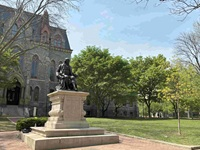Speaker
Description
Designing superconducting qubit sensors with high sensitivity to ultra-low energy particles requires engineering chips that realize precise quantum Hamiltonians. Traditionally, creating a chip that realizes a specific Hamiltonian requires a time-consuming, iterative loop of simulations and manual adjustments. In this work, we apply supervised machine learning to dramatically accelerate this process. Using the SQuADDs open source database of chip geometries and corresponding Hamiltonians, we train a multilayer perceptron to learn the inverse mapping from target Hamiltonians directly to chip designs. This approach achieves low prediction error and reduces the design loop to a single network pass. Our results highlight a promising direction toward automating and scaling superconducting qubit sensor development.
